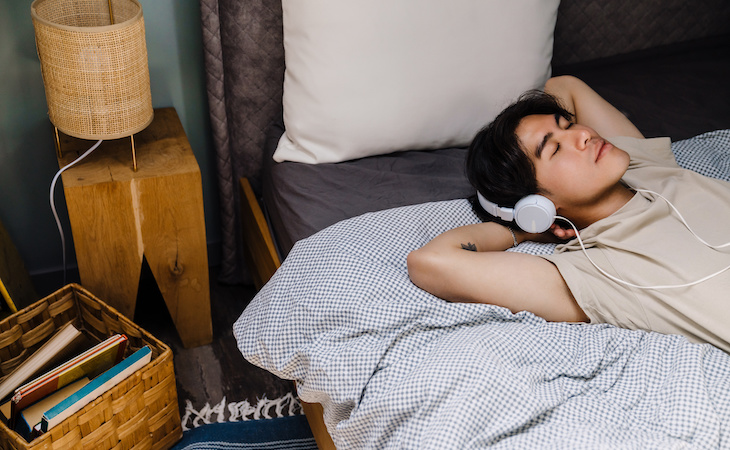From sleep hygiene strategies to supplements, there are dozens of ways to improve your sleep. But there’s a relative newcomer to the sleep medicine world you may not have tried yet, namely binaural beats.
You may never have heard of binaural beats until now. Yet if your sleep has gone south, then using binaural beats for sleep, even anxiety, could be a natural, cost-effective way to get better shuteye.
What are binaural beats?
Binaural beats are a type of auditory therapy. “They’re an auditory illusion created when two slightly different frequency tones are presented to each ear,” says Danielle Kelvas, MD, chief medical advisor at Sleepline.
The brain processes these two sounds and then perceives a third tone, which the human ear can’t typically perceive on its own. That third tone is the binaural beat.
It’s heard at a frequency that’s the difference between the other two frequencies. For instance, if your right ear is hearing a 400 hertz (Hz) tone and your left ear a 410 Hz tone, then the binaural beat is being heard at 10 Hz.
How do binaural beats work?
Brain waves are patterns of electrical activity that occur in your brain. They’re created by the millions of neurons in your brain that use this type of activity to relay information. Depending on what you’re doing during the day, those brain waves will change.
The more you’re aroused and engaged in an activity, the faster those brain waves will be. On the flip side, when you’re in a sleepy or meditative state, those brain waves will slow.
By using binaural beats and tuning your brain to a specific frequency much like you would tune into a station on a radio, “you can potentially influence your brain’s wave activity and induce a variety of desirable states, such as relaxation or focus, depending on the frequency of the binaural beat,” Kelvas says.
There are five different types of brain waves. They include the following:
- Gamma (higher than 30 Hz): When you’re concentrating, learning, and focusing, your brain will produce gamma waves. If you listen to these beats at 40 Hz, then you might even improve your memory, cognition, and mood.
- Beta (13-30 Hz): This is where your brain does most of its activities while you’re awake. When your brain is producing these waves, you’re alert and active.
- Alpha (8-12.99 Hz): With these waves, you’re feeling relaxed. You’re perhaps unwinding, not really concentrating on anything particular at this time.
- Theta (4-7 Hz): When your brain is in light sleep, it’ll produce theta waves, which are also associated with meditation.
- Delta (0-3 Hz): This is when you reach deep sleep. Dreaming often occurs during delta waves.
Can binaural beats help you sleep?
There’s some research to suggest that binaural beats can improve your sleep. In a study from the European Journal of Sport Science, for instance, young elite soccer players improved their perceived sleep quality after an eight-week period in which they slept with binaural beats ranging from 2 to 8 Hz.
What gives?
“Some researchers claim that binaural beats can conjure up a meditative state similar to that brought on by a meditation session but at a much quicker pace,” says Kevin Huffman, DO, board-certified bariatric physician and CEO and founder of AmBari Nutrition who wasn’t connected with the study but has recommended binaural beats for his patients. “Meditation is known to improve sleep so it stands to reason that binaural beats can deliver the same health benefits.”
There’s also anecdotal proof. Patience Chigadora, spiritual teacher and holistic wellness guide in the United Kingdom, recommends binaural beats to her clients who are having sleep woes, namely because “the beats have a way of gently guiding your brainwaves and leading your mind into a serene and sleep-ready space,” she says.
Many of her clients report that they’re able to get to sleep quicker, enjoy deeper sleep, and manage sleepless nights better.
How do you use binaural beats for sleep?
You’ll have to experiment to see if binaural beats are an effective sleep strategy for you as they don’t work for everybody. If you want to try it, then use a comfortable pair of stereo headphones, Kelvas says. Soft earbuds can work too, just as long as there’s sound going into both ears.
Then choose the right frequency. For sleep, frequencies in the delta and theta ranges are commonly recommended, Chigadora says. You can find binaural beats soundtracks available for free on YouTube. Just search for the specific type of wave you want.
Here are a few options from the SleepTube channel on YouTube:
Plan to listen for 15 to 30 minutes before bed, Kelvas says. Check, though, that your sleep environment is relaxing, which means dimming the lights, disconnecting from electronic devices, and reducing exposure to screens at least an hour before bed, Chigadora adds.
Some people also use binaural beats during sleep. If that’s the case, then make sure your headphones or earbuds won’t disturb your sleep posture and watch the volume. Keep it low and comfortable so that it supports your sleep versus disturbing it, Chigaroda says.
FAQs
What are the benefits of listening to binaural beats?
Binaural beats are commonly used to improve sleep. Data also suggests that they can improve memory and attention, reduce anxiety, and possibly lower pain in certain situations.
Do binaural beats really help sleep?
Although not everybody will respond the same way to binaural beats, there’s some data to support that sleep improves when you use binaural beats. You’ll have to experiment with them to learn if they’re right for you.
Which binaural beats are the best for sleeping?
In a few studies, beats that fall between 1 and 4 Hz have been linked to deep, restorative sleep, while those between 4 and 8 Hz are associated with better REM sleep, lower anxiety, and a higher meditative state, Huffman says.
Next up, find out what lo-fi music is and whether it can help you sleep better.




